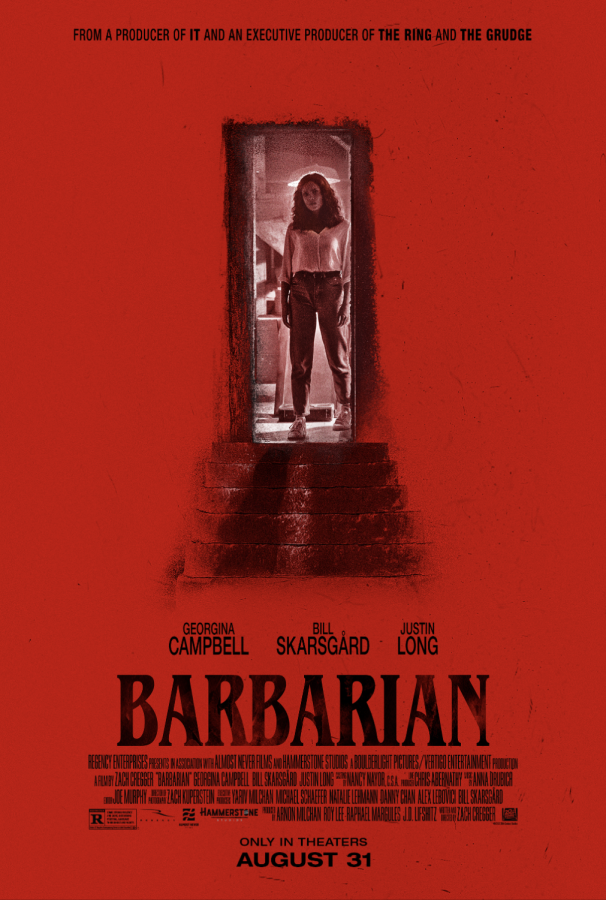*Spoilers Ahead*
Zach Cregger’s “Barbarian” takes eerie basements and sketchy hotels to a whole new level in the American horror film that hit theaters on Sept. 9, 2022. The story follows a woman who rents an Airbnb in Detroit, only to find that a stranger is already staying there. Filled with jump scares and shocking plot twists, “Barbarian” not only makes viewers question where the storyline is going but also forces them to re-evaluate the societal roles of certain groups and individuals.
After coming to Detroit for a job interview, Tess Marshall, played by Georgina Campbell, shortly realizes she has more concerns to worry about than just impressing a future employer. Her roommate for the night, Keith, played by Bill Skarsgard, appears to be a potential threat, as he encourages Tess to stay and presents himself as the so-called “nice guy” to not come off as creepy. Alongside Tess, viewers begin to slowly gain trust in Keith as he reveals himself to be a seemingly normal guy who just happened to also get scammed by the Airbnb website. Creaking doors and strange noises in the house confirm to viewers that there’s a much darker story to the rental property than just two people booking the same night. Heading back from her interview, Tess gets chased in the house by what seems like a man who is about to attack her. The audience later finds out that he was only trying to warn her of the hellfire that is the house’s basement, which Tess experiences herself in the next scene.
Frightened by a spooky bedroom with a camera propped up, Tess tries to escape but only discovers more doorways of dark and twisty tunnels that she later tells Keith about, which unintentionally puts the two of them in danger. When Keith goes missing, the first real monster in the film is revealed — a creepy naked animalistic woman who bites him and crushes his head into a wall. Played by Matthew Patrick Davis, this monster is referred to as “The Mother” because of her fantasy of having a baby. The only way to calm her down is by breastfeeding or coddling. A distressed Tess who had to watch her new friend and roommate brutally die takes a leap of faith to save herself and the film cuts to a completely different environment, introducing another key character named AJ, played by Justin Long.
Working as an actor in the film, AJ is the epitome of a white, privileged man in Hollywood who doesn’t have to face the consequences of his actions. His manager informs him of a rape accusation against him and rather than taking responsibility for it, AJ is more focused on how it will affect his future career. Cregger uses AJ’s character to serve as a reminder of the privilege that a rich white man holds in society, as AJ proves to be an ignorant character that only cares about money when he returns to the Airbnb that is supposedly his house. Despite the awful person he shows himself to be, his character also provides satirical comic relief when he accidentally wanders into the basement trying to calculate the square footage of the house, completely ignoring the sheer creepiness of the scene. His lack of awareness leads him
to Tess, and eventually to his death. The failed redemption arc of his character when he tries to shallowly apologize for his mistakes allows the audience to feel no pity when he gets his eyes ripped out by The Mother.
A similarly creepy, if not worse man who is introduced to the storyline through a flashback reveals himself to be the real cause behind all of this destruction, clearing up confusion for viewers. The flashback clip shows this man as the first owner of the house, in which he used the basement for human trafficking, luring in innocent victims and producing generations of children through incest, all of which resulted in The Mother. Before his death, AJ approaches this man, finding him rotting on a bed in one of the basement rooms, and comes to the realization of how disturbing and sick the man is after finding multiple tape recordings on his shelf. The man ends up shooting himself as a result of the confrontation. The audience can see the similarities and differences between these two men and how their accusations and outcomes have played out over time.
For instance, this man has run a trafficking scheme for decades and it’s all been swept under the rug until now. When Tess tries to contact the police for help, they do little to nothing about the situation and do not care to even listen to her. Here, the film sends a message to the audience that tragedies can easily be covered up while authority figures are kept oblivious to the reality of the situation. Additionally, Cregger plays with power dynamics and gender roles by creating realistic depictions of how male characters in this film view women as crazy and don’t take them seriously. This is exemplified by the police belittling Tess’ judgment, AJ not owning up to his accusation and The Mother being depicted as the villain, even though her father is the one to blame. Overall, “Barbarian” leaves the audience with much to think about, as the ending is left relatively open. While the jump scares are pretty spooky, the film’s implicit themes through realistic representations of violence and trauma succeed at creating a bone-chilling, nauseating experience for viewers.
Julia King can be reached at [email protected].


















